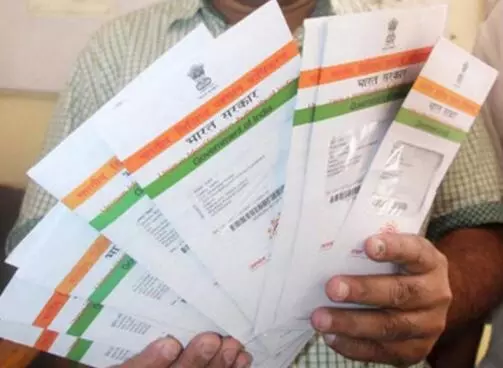
Govt expands use of Aadhaar beyond banks, allows non-banking firms to use it for customer verification
text_fieldsNew Delhi: The Indian Finance Ministry has allowed 22 non-banking financial entities, including Amazon Pay (India) Pvt. Ltd, Aditya Birla Housing Finance Ltd, and IIFL Finance Ltd to use Aadhaar authentication to verify the identity of their customers under the Prevention of Money Laundering Act.
According to The Indian Express report, the move is part of a series of changes being undertaken to plug loopholes in the money laundering law ahead of India's proposed assessment under the global money laundering and terrorist financing watchdog, the Financial Action Task Force (FATF).
The amendment will allow these reporting entities, other than banking companies, to comply with the standards of privacy and security under the Aadhaar (Targeted Delivery of Financial and Other Subsidies, Benefits and Services) Act, 2016, and perform authentication under the Aadhaar Act for the purposes of Section 11A of the Money Laundering Act.
Section 11A of the Prevention of Money Laundering Act requires verification of identity by reporting entities. Non-banking regulated entities that are considered reporting entities under the Prevention of Money Laundering Act can be allowed to conduct such authentications if their approval is accepted by the Unique Identification Authority of India (UIDAI), the Aadhaar agency, depending on their data security practices.
E-KYC (know your customer) carried out through OTP-based Aadhaar authentication allows entities to offer a limited set of services to their users. Such a KYC has to be renewed every year, and the aggregate amount of term loans sanctioned shall not exceed Rs 60,000 in a year.
In 2019, the Indian government amended the Aadhaar Act, allowing only banking and telecom companies to carry out such authentications for KYC requirements.
The amendment was necessitated after the Supreme Court, in 2018, had struck down Section 57 of the Aadhaar Act, which allowed the use of Aadhaar data by any “body corporate or person” – essentially private companies – to establish the identity of an individual for being “unconstitutional”. The subsequent 2019 amendment was also challenged in the Supreme Court, and the case is yet to come to a conclusion.
The Ministry of Electronics and IT (MeitY) recently proposed allowing a wide range of private entities to carry out Aadhaar authentication for a number of services, expanding the use of the digital identity beyond its ministries and departments.
According to amendments proposed to the Aadhaar Authentication for Good Governance (Social Welfare, Innovation, Knowledge) Rules, 2020, by the IT Ministry in April, private entities and state governments would be allowed to conduct Aadhaar-based authentication for promoting “ease of living” of residents and enabling better access to services for them, among other things.

















